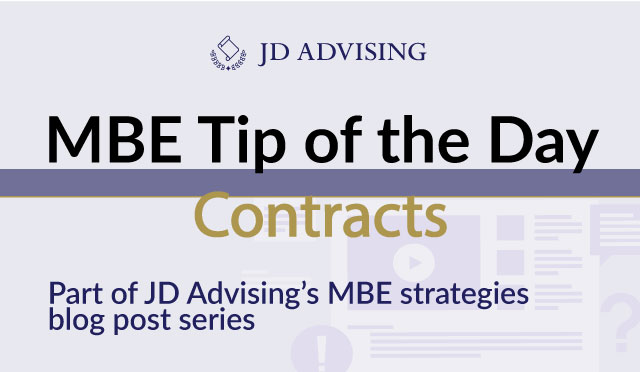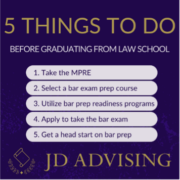MBE Strategies Tip #4 – Contracts and Sales
MBE Strategies Blog Post Series: Welcome to our MBE tips and tricks blog post series! This post covers a Contracts/Sales MBE question. Many students get tricked by MBE questions on Contracts and Sales since they are so detail-oriented. You will see 25 questions on Contracts and Sales on the Multistate Bar Exam.
Note that we have posted several MBE tips (which you can find links to at the bottom of this post) that focus on a specific multiple-choice question that many students answer incorrectly. If you can master these questions, it could increase your MBE score by that many points if you see any of these issues tested again (which, by the way, you will!). These posts of MBE tips and tricks will not only cover substantive law but also strategy. So each “MBE tip of the day” post covers one highly-tested area of substantive law as well as an important MBE strategy. You can sign up to receive these posts directly to your inbox for the upcoming administration at the bottom of this page.
Once you are done reading the Contracts MBE question, uncover the answer as well as read more about our MBE strategy of the day.
Show Contracts and Sales MBE question ...
Contracts and Sales MBE Question:
An owner of a bicycle warehouse had a conversation with a customer who was interested in buying a popular mountain bicycle. The customer was eager to buy a bicycle and stated that he would talk to his wife to see if she would agree to let him buy it. The customer asked the owner of the bicycle warehouse if the owner would hold the offer for the bicycle open. The owner assured the customer, in a signed writing, that the owner would hold open the offer for the mountain bicycle. No time period was stated.
Two months later, the customer arrived at the owner’s store, ready to buy the bicycle. The owner apologized and explained that the bicycle was already sold. The customer filed a lawsuit against the owner for improper revocation of his offer.
Was the owner’s revocation proper?
(A) No, because if a firm offer does not state a time period, it is held open for three months.
(B) No, because the customer relied on the owner’s offer.
(C) No, because a reasonable time had not passed since the firm offer was made.
(D) Yes, if a reasonable time had passed since the firm offer was made.
Subject:
Legal Issue:
Legal Rule and Analysis: (If you need to look at your outline to find the legal rule, feel free to use it when you have not yet memorized the subject. Using your outline will help you actively learn and memorize your outline!)
Conclusion:
Look at the answer choices provided. Choose an answer choice that matches your conclusion. Review the other answer choices provided.
Show Answer to the Sales MBE question
Answer to Sales MBE Question:
Common Mistake: Students forget the details of the law! Students most commonly pick answer choice (A)–an incorrect answer choice.
Subject: Sales
Legal Issue: Can the owner revoke his offer?
Legal Rule and Analysis: One can generally revoke an offer unless it is a firm offer, option contract, beginning performance on a unilateral contract, or if there is reasonably foreseeable substantial reliance. (You can think of the mnemonic “FOUR” — there are FOUR scenarios in which one cannot revoke an offer: firm offer, option contract, beginning performance on a unilateral contract, or reasonably foreseeable substantial reliance on the offer.)
In this case, the only one that is relevant is firm offer. A firm offer is one made by a merchant for the sale of goods in a signed writing that promises to leave the offer open for a stated time (or a reasonable time will be implied), but either way it cannot be for over three months.
Conclusion: In this case, since no time period was stated, it depends on whether the owner waited a reasonable time to revoke his offer.
Choose an answer choice that most closely matches your conclusion and explain why the others are incorrect: (D) is correct. (D) matches most closely with the conclusion because it recognizes what the issue turns on. (A) is incorrect. Three months is not the “default” time period that a firm offer will be held open. The default time period for a firm offer to be held open is a “reasonable time” not exceeding three months. (B) is incorrect. Mere reliance on an offer is not an exception to revocation unless there is reasonably foreseeable substantial reliance on the offer. (Generally this arises in bidding situations on the bar exam. Otherwise, it is not typically considered reasonable to rely on an offer.) (C) is incorrect. We are not mountain bike experts so how do we know what is considered to be a reasonable time? Be wary of MBE answer choices like this–ones that force you to make a judgment that you are not able to make–like how long it is reasonable to leave open an offer for a popular mountain bike! (D) recognizes that there may be room for argument (by using the word “if”) and is thus, the better answer.
MBE Tip: Spend more time on the MBE topics that are difficult for you. If you are stellar at Torts and Constitutional Law but you really need to review Contracts and Sales, there is no reason to treat all subjects equally (in terms of the amount of time you will spend on them). You know what you need to spend time on better than a bar review course—write out a list of all the topics, from your best to your worst, and allocate your time accordingly. Even spending an extra day or two on a subject can make a big difference. This is especially the case if you have not yet memorized the details of the law — you can see by this question that it is not enough to have a “general idea” of the law—you need to know the details!
Indeed, the best way to avoid getting tricked by MBE questions is to learn the law really well, so that you do not fall into MBE traps!
If you have trouble with the comprehension portion of the law (or if you want outlines that are organized in a logical way that will help you memorize the details!) please feel free to sign up for a private tutoring session for the subjects that are harder for you. A lot of students get private tutoring for Real Property and Contracts–as these tend to be the most difficult subjects for students on the MBE. This will help you on both the essay and the multiple-choice portion of the bar exam.
Show Summary of the Two Key Takeaway Points for the Day
Key Takeaways for the day:
Takeaway for the Law: Today we reviewed two important aspects of law — when one can revoke an offer (they love revocation questions on the MBE!) and the nuances of firm offer.
Revocation: One can generally revoke an offer unless it is a firm offer, option contract, beginning performance on a unilateral contract, or if there is reasonably foreseeable substantial reliance. (We remember the mnemonic FOUR — there are FOUR scenarios in which one cannot revoke an offer: firm offer, option contract, beginning performance on a unilateral contract, or reasonably foreseeable substantial reliance on the offer.)
Firm offer: A firm offer is one made by a merchant for the sale of goods in a signed writing that promises to leave the offer open for a stated time (or a reasonable time will be implied), but either way it cannot be for over three months.
Takeaway for Practicing: Spend more time on the subjects that are difficult for you! There is no need to “treat all subjects equally!” when you study. If you need private tutoring or outside help, seek it out now rather than waiting. The best way to avoid getting tricked by MBE questions is to learn the law really well, so that you do not fall into MBE traps!
Also, be smart about which answer choice you pick for an MBE question–if it asks you to make a judgment you are not qualified to make, you know it is not correct! This is another way to avoid getting tricked by MBE questions!
If you would like to see “MBE tip of the day” posts from prior days, please click on the links below:
Show MBE tip posts from past days
- MBE Strategies: Day 1 – Torts (negligence)–and how to approach MBE questions.
- MBE Strategies: Day 2 – Criminal Law (homicide) — and learning through “wrong” answers.
- MBE Strategies: Day 3 — Evidence (hearsay) –and memorizing the details!
- MBE Strategies: Day 4 – Contracts and Sales – and spending time on the subjects that are difficult for you.
- MBE Strategies: Day 5 – Real Property (future interests) – and spending time on the highly-tested areas of law.
- MBE Strategies: Day 6 – Civil Procedure (summary judgment) – and eliminating incorrect answers.
- MBE Strategies: Day 7: Constitutional Law (political question, standing) – and how to answer a question correctly when you are in between two choices.
- MBE Strategies: Day 8: Evidence (hearsay, best evidence rule) – and why it is good to fine-tune your knowledge of the “red herring” areas of the law.
- MBE Strategies: Day 9: Torts (conversion) – and where to get actual released MBE questions!
- MBE Strategies: Day 10: Criminal Procedure (5th Amendment) – and how to pick between two answer choices.
- MBE Strategies: Day 11: Contracts (contract formation) – and what to do if you “overthink” questions.
- MBE Strategies: Day 12: Real Property (deed delivery) – and jotting out the fact pattern.
- MBE Strategies: Day 13: Civil Procedure (jurisdiction) – and “bringing it all together”.
- MBE Strategies: Day 14: Constitutional Law (taxing and spending) – and why to answer more Constitutional Law and Civil Procedure questions.
- MBE Strategies: Day 15: Constitutional Law (powers of congress) – and how to get better at Constitutional law questions.
- MBE Strategies: Day 16: Criminal Procedure (exclusionary rule) – and paying attention to the call of the question.
- MBE Strategies: Day 17: Evidence (character evidence) – and how to tell a civil case from a criminal case (and why it matters!).
- MBE Strategies: Day 18: Real Property (joint tenancy) – and how to get more Real Property questions right!
- MBE Strategies: Day 19: Civil Procedure (JAAMOL) – and how to learn Civil Procedure.
- MBE Strategies: Day 20: Torts (joint and several liability) – and tips on MBE default rules.
- MBE Strategies: Day 21: Evidence (hearsay) – and the importance of memorizing the law!
- MBE Strategies: Day 22: Contracts (formation) – and why you should not ignore the written portion of the bar exam!
- MBE Strategies: Day 23: Criminal Law and Procedure (and the importance of mens rea).
- MBE Strategies: Day 24: Constitutional Law (equal protection) – and the importance of writing incorrect answers down!
- MBE Strategies: Day 25: Civil Procedure (impleader) – and free released NCBE questions!
- MBE Strategies: Day 26: Real Property (future interests) – and learning the highly tested MBE topics.
- MBE Strategies: Day 27: Torts (intentional torts) – and the importance of learning rule statements.
- MBE Strategies: Day 28: Evidence (impeachment) – and how to keep impeachment, character evidence, etc. straight!
- MBE Strategies: Day 29: Criminal Procedure (line-ups) – and how charts can help you keep the 5th, 6th, and 14th Amendment straight!
- MBE Strategies: Day 30: Contracts (revocation of acceptance of goods) – and how finding patterns in your answer sheet can improve your score.
- MBE Strategies: Day 31: Constitutional Law (public v. private forum) – and last-minute MBE tips.
- MBE Strategies: Day 32: Torts (premises liability) – and eliminating incorrect statements of law.
- MBE Strategies: Day 33: Criminal Law (robbery) – and knowing your state vs. MBE distinctions.
- MBE Strategies: Day 34: Real Property (priority and recording acts) – and writing answers to the questions.
- MBE Strategies: Day 35: Torts (comparative negligence, joint and several liability) – and learning the theories behind the laws.
- MBE Strategies: Day 36: Contracts and Sales (recovering the purchase price) – and creating a timeline of events when answering MBE questions.
- MBE Strategies: Day 37: Constitutional Law (1st Amendment) – and making a diagram as you study.
- MBE Strategies: Day 38: Evidence (extrinsic evidence) – and learning the definitions of basic legal terms.
- MBE Strategies: Day 39: Civil Procedure (motion to dismiss) – and creating a timeline of the judicial process while studying.
- MBE Strategies: Day 40: Real Property (present and future interests) – and the importance of grammar.
- MBE Strategies: Day 41: Torts (battery) – and paying close attention to the call of the question.
- MBE Strategies: Day 42: Criminal Procedure (4th Amendment) – and why you shouldn’t skip straight to the narrow rules.
- MBE Strategies: Day 43: Criminal Law (burglary) – and why you need to know the elements of crimes!
- MBE Strategies: Day 44: Contracts and Sales (damages) – and answering the question in your head first.
- MBE Strategies: Day 45: Constitutional Law (interstate commerce and equal protection) – and paying attention to which entity is attempting to act.
- MBE Strategies: Day 46: Evidence (impeachment) — and how to identify the applicable evidentiary rule.
- MBE Strategies: Day 47: Civil Procedure (full faith and credit clause and preclusion) – and newly released NCBE civil procedure questions.
- MBE Strategies: Day 48: Civil Procedure (removal) – and understanding the policies behind the rules.
- MBE Strategies: Day 49: Real Property (eviction) – and the importance of paying attention to details!
- MBE Strategies: Day 50: Torts (trespass) – and the importance of memorizing the elements and categories of torts.
- MBE Strategies: Day 51: Evidence (lay witness testimony) – and avoiding distractions.
- MBE Strategies: Day 52: Civil Procedure (automatic disclosures) – and eliminating answer choices.
- MBE Strategies: Day 53: Torts (duty of a premises possessor) – and to not feel too sorry for vulnerable plaintiffs!
- MBE Strategies: Day 54: Real Property (equitable servitudes) – and finding differences in concepts.
- MBE Strategies: Day 55: Civil Procedure a bonus FIVE MBE tips!
- MBE Strategies Day 56: Constitutional Law (equal protection) – and memorizing the standards of review.
- MBE Strategies Day 57: Contracts (installment contracts) – and learning the nuances of the law.
- MBE Strategies Day 58: Criminal Procedure (5th Amendment) – and understanding the scope of constitutional rights.
- MBE Strategies Day 59: Civil Procedure (exception to final judgment rule) – and understanding the rules and their exceptions.
- MBE Strategies Day 60: Evidence (which law applies to privileges in federal court) – and the importance of knowing the law.
Looking for additional MBE help?
If you are looking for MBE help, read our 10 expert MBE tips here. Check out our step-by-step guide to improving your MBE score, please review this post for an overview of tips. If you would like to have the next MBE tip emailed to you when we come out with another one, please fill out the form below.
MBE Tip of the Day
Seeking MBE Assistance?
Seeking MBE Assistance?
- 📘 MBE Guide: Equip yourself with our FREE expert-crafted bar exam and MBE guides.
- Free Bar Exam Resource Center: Discover top resources, articles, and free webinars led by renowned bar exam professionals.
Top Resources as Vouched by our Students:
- MBE One-Sheets: One of our most highly acclaimed bar exam supplements!
- Bar Exam Outlines: Our comprehensive and condensed bar exam outlines present key information in an organized, easy-to-digest layout.
- MBE Private Tutoring: Opt for personalized, effective strategies.
- On Demand Bar Exam Course: Comprehensive bar exam preparation.
- Bar Exam Crash Course and Mini Outlines: Acclaimed and effective for a quick refresher.
- MBE Mastery Class, Real MBE Questions, and MBE Guide: Elevate your MBE preparation with these high-quality MBE supplements!
🔥 NEW! Check out our Repeat Taker Bar Exam Course and get introduced to our unmatched platinum Guarantee Pass Program.






Trackbacks & Pingbacks
[…] Strategies: Day Four – Contracts and Sales – and spending time on the subjects that are difficult for […]
[…] Strategies: Day Four – Contracts and Sales – and spending time on the subjects that are difficult for […]
[…] Strategies: Day Four – Contracts and Sales – and spending time on the subjects that are difficult for […]
Comments are closed.